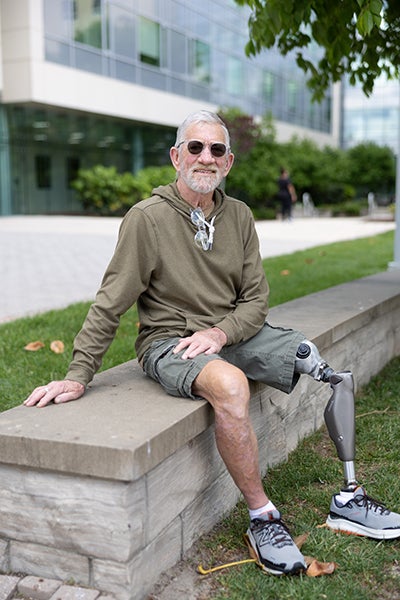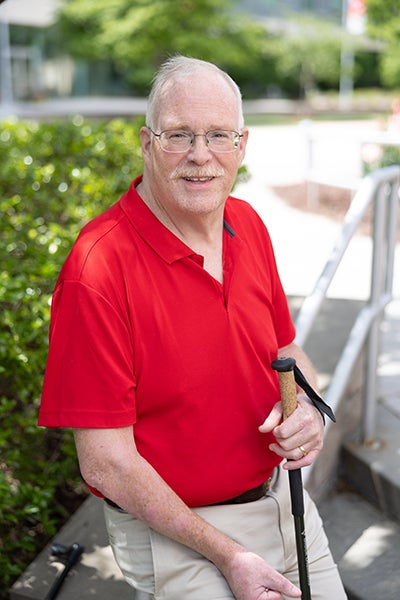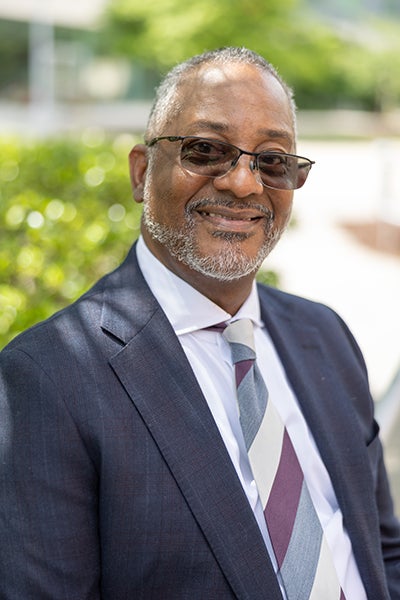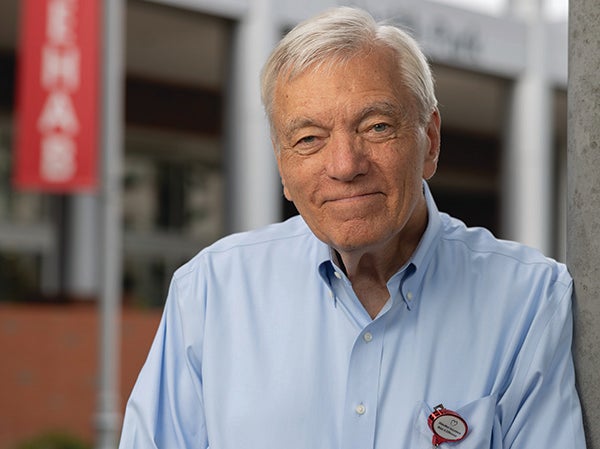The Ties that Bind: Retired Rehab Manager Skip Roy Revitalizes Peer Support Volunteer Program
September 19, 2024With more than 50 years of dedicated service to WakeMed, Skip Roy is a treasured member of the local health care community. He began his employment with WakeMed in 1969, as a physical therapist, and was soon promoted to manager of Acute Rehabilitation Services. During his career, Skip played an invaluable role in growing the health system’s rehab continuum. In October 2012, he retired from management but soon became a supplemental physical therapist, and today he serves as a dedicated hospital volunteer.
How does he answer the call?
A volunteer at heart, Skip offers his time to numerous local and international non-profit health care organizations. He is passionate about using his rehab expertise to help people reclaim their quality of life. Therefore, it was no surprise that Skip was tapped to reenergize the Rehab Hospital’s Peer Support Volunteer Program in 2022.
“The COVID-19 pandemic had an impact on many of the hospital’s volunteer programs, and this was no exception,” Skip explained. “While the Peer Support Volunteer Program began in 2018, it needed a dedicated program coordinator to give it the attention it deserved. When they asked me to help, I was up for the challenge.”
What is the Peer Support Volunteer Program?
The Peer Support Volunteer Program facilitates visits between current rehab patients and former patients who have re-established themselves in the community after
experiencing a stroke, life-changing injury or amputation. The program is divided into four areas of care: stroke, spinal cord injury, brain injury and limb loss/amputee; and the goal is to create supportive relationships and inspiration for patients who are in the hospital facing a long road to recovery.
“This program is about hope,” says Skip. “Trauma professionals are amazing because they can give patients their bodies back after a life-altering event. But in the
rehab world, we work to give people their lives back. Peer supporters initiate that process by giving hope.”
To begin, rehab caregivers identify former patients who may be interested in serving as peer support volunteers. They contact the patients nine to twelve months after their hospital stay to see if there is interest in volunteering. If they decide to participate, Skip helps them navigate the WakeMed Volunteer Services application and orientation process. He then provides a program-specific orientation to get them started – and helps get them connected with current hospital patients who would like a visit from a peer support volunteer. While the WakeMed team helps coordinate the first meeting, subsequent meetings can be arranged between the patient and volunteer if desired.
“Following a major, life-changing health event, many rehab patients think that life has ended,” says Skip. “But our peer supporters show them that they can get their lives back, have families and careers, re-engage in hobbies, and much more. Life will be different, but it is not over. This realization is important to recovery.”
Skip also supports the Rehab Hospital leadership team in coordinating an annual recognition event for the peer support volunteers and writes a column for their quarterly newsletter known as ‘Skip’s Corner.’
“I am committed to this special program because I want all patients to recover and enjoy a wonderful life,” concludes Skip. “As a physical therapist, I can do a lot for my patients, but I can’t give them the same degree of understanding and hope that a former patient can. Because I haven’t lived through the same challenges, there’s only so much I can say or do to reassure them. That’s where our volunteers come in – and they are a truly remarkable asset.”
Through Skip's leadership and the unwavering support of our peer support volunteers, patients who are facing seemingly insurmountable obstacles are offered a sense of community and hope that can be truly life-changing.
Meet Our Dedicated Volunteers
Tim Gunning
Amputee/Limb Loss
Peer Support Volunteer
 Eleven years ago, Tim's left leg was amputated above the knee after several unsuccessful surgeries led to infection. He spent two weeks at WakeMed Rehab and later received a prosthetic leg. After just five outpatient appointments with his prosthetic, Tim’s treatment ended.
Eleven years ago, Tim's left leg was amputated above the knee after several unsuccessful surgeries led to infection. He spent two weeks at WakeMed Rehab and later received a prosthetic leg. After just five outpatient appointments with his prosthetic, Tim’s treatment ended.
“It was all insurance would cover, but it wasn’t enough,” reflects Tim. “But there were no special support programs back then, so I learned how to be an amputee on my own.”
Fortunately, Tim went back to work in commercial architecture/ construction and lived a productive life after his amputation. But upon retirement, he felt called to give back.
“I wanted to offer other amputees the support and first-hand insights I never had,” says Tim. “Amputation is life-changing – only other amputees can truly understand.”
In 2021, Tim became a peer support volunteer. He visits patients regularly and has supported more than 30 amputees thus far. The work brings him great joy, especially when patients smile and say thank you, and he senses that they will be okay.
“Helping people understand what to expect is a big responsibility,” says Tim. “We discuss many topics, but I focus on healing, health and setting goals, especially the big goal of walking again. It’s that positive mindset I want to leave behind.”
Chris Clarke
Stroke Peer Support
Volunteer
 After Chris Clarke suffered a stroke in 2016, he embarked on a difficult, 18-month recovery. He never returned to work, and he lost the use of his right arm and foot.
After Chris Clarke suffered a stroke in 2016, he embarked on a difficult, 18-month recovery. He never returned to work, and he lost the use of his right arm and foot.
During Chris’ hospitalization, the Peer Support Volunteer Program did not exist. However, he was visited by a friend who had also suffered a stroke, and it helped a lot. Once well enough, Chris worked with Rehab leaders to become a peer supporter. It’s been six years, and Chris continues to visit up to four patients every week. They discuss their experiences, and Chris recommends community resources for support.
“Stroke is devastating and lonely, but patients must know that they’re not alone,” says Chris. “It helps a great deal to speak with someone who has been down the same road. I emphasize that patients can recover missing parts of themselves if they keep working.”
Chris aims to create hope, inspire positivity, and help bridge patients back to the world. His visits have included patients with language loss and a young mother who couldn’t envision her future.
“This role is incredibly rewarding,” concludes Chris. “I find joy in helping patients see where they can go. While stroke will change your life, life can still be good.”
Byron Stallings
Stroke Peer Support
Volunteer
 As a peer supporter and ordained pastor, Byron Stallings is passionate about hope. The word ‘hope’ is even inscribed on the wooden cross he gifts patients upon each visit.
As a peer supporter and ordained pastor, Byron Stallings is passionate about hope. The word ‘hope’ is even inscribed on the wooden cross he gifts patients upon each visit.
“After my stroke, I felt alone, despite a lot of support,” explains Byron, who became a peer supporter last year. “It was a dark path to travel. But God brought me back from the darkness to help other stroke patients realize that things will be okay.”
Byron experienced three strokes between 2019 and 2020, the last two being so severe that doctors didn’t think he would survive. He continues to manage post-stroke aphasia (language loss), although he has worked tirelessly to speak again. To inspire others with his progress, Byron visits patients who also have aphasia. He sees up to four patients every other week, and because he no longer drives, his wife provides transportation. She knows the visits are beneficial to Byron and his own recovery, as his visits also remind him of how far he’s come in a short time.
“It makes me happy to offer patients hope,” says Byron. “Some ask for my phone number so we can stay in touch. Nothing compares to talking with someone who’s been there. I show patients that if I can do it, they can too.”
This article is reprinted from Reconnections.
